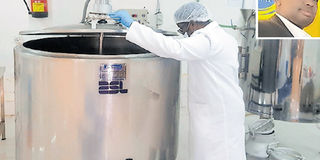Father, son join forces to set up first camel milk processor

Bashir Warsame at their camel milk processing plant in Industrial Area, Nairobi and (inset) His father Hassan Warsame. The two have ventured in camel milk value addition selling the product in major supermarkets in Nairobi that include Carrefour, Chandarana and Shoprite. PHOTOS | RICHARD MUNGUTI | NMG
What you need to know:
- The company makes a variety of camel milk products that include yoghurt and fresh milk branded as Nuug, which means nourish.
- Among the qualities they look for in the milk is freshness, which is determined by lactose level and milk density, which is as a result of the health of the camel.
- Dr Kenneth Wameyo, a veterinarian, says laboratory tests have proven that camel milk is highly medicinal and can control diseases like diabetes, arthritis, cancer and asthma.
- Camel milk has 50 per cent less fat than cow milk and three times more in vitamin C content.
When Bashir Warsame returned home from the United States in 2014, he had one objective in mind – to invest in the camel milk industry.
The agripreneur, 25, a graduate of public administration from the University of Minnesota, did market research and identified a gap in camel milk production and value addition.
Together with his father, Hassan Warsame, he traversed various camel-rearing counties to identify future suppliers of milk.
They further looked at various research and academic literature to understand the sector. Bashir says they found out that Kenya is the fifth largest camel hub in the world, with 3.3 million animals being kept.
The animals, according to him, graze on natural shrubs and herbs in the arid regions, which makes their milk healthier.
They sunk into the business Sh20 million, starting with 40 litres but are now processing over 300 litres under their firm Kulan Foods Limited, which is located in Industrial Area, Nairobi.
The company makes a variety of camel milk products that include yoghurt and fresh milk branded as Nuug, which means nourish.
The products are sold in major supermarkets in Nairobi that include Carrefour, Chandarana and Shoprite. Besides the retail chains, they also sell their products through their restaurant in Nairobi.
“We source our camel milk from farmers in Voi and Isiolo. They sell to us in 50-litre milk cans that goes for Sh6,000. We have two vehicles with inbuilt refrigerators, one for Voi and another for Isiolo. These vehicles transport the milk from the two locations daily,” says Bashir. He adds that they work with specific farmers, 20 in number.
“We have trained them on how to handle milk to ensure quality standards are maintained. Per day each herder gives us between 20-50 litres,” says Hassan.
Among the qualities they look for in the milk is freshness, which is determined by lactose level and milk density, which is as a result of the health of the camel.
“We have an in-house lab technician who tests milk from various herders for quality. Milk that does not meet our standards is not used. The rest of the milk is pasteurised,” notes Bashir, adding the products go from Sh150 to Sh320.
CURRENTLY UNDERVALUED INDUSTRY
Dr Kenneth Wameyo, a veterinarian, says laboratory tests have proven that camel milk is highly medicinal and can control diseases like diabetes, arthritis, cancer and asthma.
“In developed economies, camel milk products are processed and kept in pharmaceutical shops where they are sold just like any other medicine,” he says.
Ewaso Nyiro North Development Authority director, Mr Robert Lemerketo, reckons that the country should embrace camel milk.
“This industry is currently undervalued yet its outcome when fully exploited could rival other foreign exchange earners and boost the livelihoods of the herders,” he says.
Davis ole Dikir from Narok County says he finds camel milk healthier because the animals are disease-resistant, which means they are not treated with antibiotics that sometimes get into milk. Bashir says he is carrying out an awareness campaign to help the public embrace camel products.
“Consumers have certain perceptions and sometimes phobia against camel milk products. But we go to supermarkets with samples to help consumers understand the benefits of the milk. Initially, we struggled but now people are enjoying it especially when they learn the benefits,” he says.
Initially, camels were associated with northern Kenya but other communities have begun to try their luck in herding the ‘desert animals’.
“People take camel milk for different reasons. Some for its general nutritional value, others because they are lactose-intolerant or have medical ailments,” says Bashir.
Camel milk has 50 per cent less fat than cow milk and three times more in vitamin C content.
It does not contain the protein that causes an allergic reaction to milk. Therefore, people who are lactose intolerant are able to drink it.
It contains 70 per cent Vitamin B1, a serving which regulates metabolism and brain functioning, besides boosting the immune system.
It is estimated that yearly turnover of camel milk both in informal and formal trade has surpassed Sh10 billion per annum, and all the milk is produced by 3.3 million camels.




